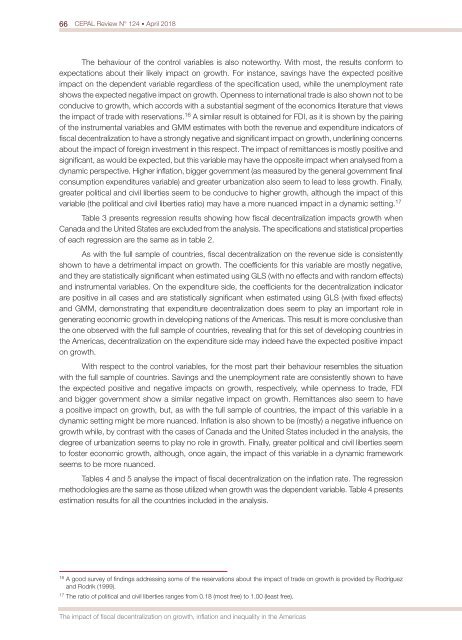CEPAL Review no. 124
April 2018
April 2018
You also want an ePaper? Increase the reach of your titles
YUMPU automatically turns print PDFs into web optimized ePapers that Google loves.
66 <strong>CEPAL</strong> <strong>Review</strong> N° <strong>124</strong> • April 2018<br />
The behaviour of the control variables is also <strong>no</strong>teworthy. With most, the results conform to<br />
expectations about their likely impact on growth. For instance, savings have the expected positive<br />
impact on the dependent variable regardless of the specification used, while the unemployment rate<br />
shows the expected negative impact on growth. Openness to international trade is also shown <strong>no</strong>t to be<br />
conducive to growth, which accords with a substantial segment of the eco<strong>no</strong>mics literature that views<br />
the impact of trade with reservations. 16 A similar result is obtained for FDI, as it is shown by the pairing<br />
of the instrumental variables and GMM estimates with both the revenue and expenditure indicators of<br />
fiscal decentralization to have a strongly negative and significant impact on growth, underlining concerns<br />
about the impact of foreign investment in this respect. The impact of remittances is mostly positive and<br />
significant, as would be expected, but this variable may have the opposite impact when analysed from a<br />
dynamic perspective. Higher inflation, bigger government (as measured by the general government final<br />
consumption expenditures variable) and greater urbanization also seem to lead to less growth. Finally,<br />
greater political and civil liberties seem to be conducive to higher growth, although the impact of this<br />
variable (the political and civil liberties ratio) may have a more nuanced impact in a dynamic setting. 17<br />
Table 3 presents regression results showing how fiscal decentralization impacts growth when<br />
Canada and the United States are excluded from the analysis. The specifications and statistical properties<br />
of each regression are the same as in table 2.<br />
As with the full sample of countries, fiscal decentralization on the revenue side is consistently<br />
shown to have a detrimental impact on growth. The coefficients for this variable are mostly negative,<br />
and they are statistically significant when estimated using GLS (with <strong>no</strong> effects and with random effects)<br />
and instrumental variables. On the expenditure side, the coefficients for the decentralization indicator<br />
are positive in all cases and are statistically significant when estimated using GLS (with fixed effects)<br />
and GMM, demonstrating that expenditure decentralization does seem to play an important role in<br />
generating eco<strong>no</strong>mic growth in developing nations of the Americas. This result is more conclusive than<br />
the one observed with the full sample of countries, revealing that for this set of developing countries in<br />
the Americas, decentralization on the expenditure side may indeed have the expected positive impact<br />
on growth.<br />
With respect to the control variables, for the most part their behaviour resembles the situation<br />
with the full sample of countries. Savings and the unemployment rate are consistently shown to have<br />
the expected positive and negative impacts on growth, respectively, while openness to trade, FDI<br />
and bigger government show a similar negative impact on growth. Remittances also seem to have<br />
a positive impact on growth, but, as with the full sample of countries, the impact of this variable in a<br />
dynamic setting might be more nuanced. Inflation is also shown to be (mostly) a negative influence on<br />
growth while, by contrast with the cases of Canada and the United States included in the analysis, the<br />
degree of urbanization seems to play <strong>no</strong> role in growth. Finally, greater political and civil liberties seem<br />
to foster eco<strong>no</strong>mic growth, although, once again, the impact of this variable in a dynamic framework<br />
seems to be more nuanced.<br />
Tables 4 and 5 analyse the impact of fiscal decentralization on the inflation rate. The regression<br />
methodologies are the same as those utilized when growth was the dependent variable. Table 4 presents<br />
estimation results for all the countries included in the analysis.<br />
16<br />
A good survey of findings addressing some of the reservations about the impact of trade on growth is provided by Rodríguez<br />
and Rodrik (1999).<br />
17<br />
The ratio of political and civil liberties ranges from 0.18 (most free) to 1.00 (least free).<br />
The impact of fiscal decentralization on growth, inflation and inequality in the Americas


















